Growing up with domestic violence
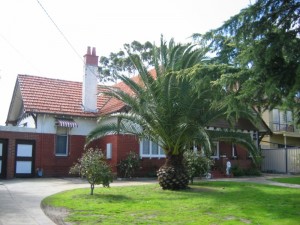 We think of domestic violence as something done by deranged men. But it is something done by everyday people. Sometimes the perpetrator is male, other times female. In our house, growing up, it was my father’s violence that snatched the headlines. My mother’s violence was considered ‘justified’.
We think of domestic violence as something done by deranged men. But it is something done by everyday people. Sometimes the perpetrator is male, other times female. In our house, growing up, it was my father’s violence that snatched the headlines. My mother’s violence was considered ‘justified’.
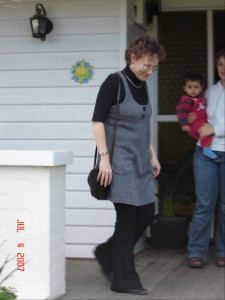 As an adult I returned to the home I’d grown up in in my first 7 years. The tenant showed me through and showed me the damage to the door jambs. Every door had once been wrenched off its hinges. She presumed the house had seen a lot of violence. And I do remember violence, but not violence of my father, but of my mother, toward me. I have no doubt he was violent to her, but for my first 7 years I can’t recall a single incident of witnessing even a push or a slap.
As an adult I returned to the home I’d grown up in in my first 7 years. The tenant showed me through and showed me the damage to the door jambs. Every door had once been wrenched off its hinges. She presumed the house had seen a lot of violence. And I do remember violence, but not violence of my father, but of my mother, toward me. I have no doubt he was violent to her, but for my first 7 years I can’t recall a single incident of witnessing even a push or a slap.
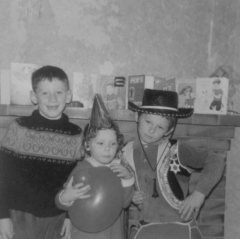 Sure, I was autistic and severely meaning deaf and saw my world in bits and was unable to simultaneously process sense of self and other let alone what one person was doing to another, so maybe all I heard was chaos and noise, all I saw was movement. But I do remember being repeatedly suffocated with a pillow in the night, being beaten until I couldn’t breathe, being strangled, being thrown at the wall in the kitchen, being hit across the back with a lump of wood, having a cigarette put out on me, having a washcloth stuffed into my mouth and whipped across the face until I vomited out my nose, being sprayed in the face with the old fly spray dispensers, and a plethora of verbal, psychological and emotional abuse. But this was not my father. This was my mother.
Sure, I was autistic and severely meaning deaf and saw my world in bits and was unable to simultaneously process sense of self and other let alone what one person was doing to another, so maybe all I heard was chaos and noise, all I saw was movement. But I do remember being repeatedly suffocated with a pillow in the night, being beaten until I couldn’t breathe, being strangled, being thrown at the wall in the kitchen, being hit across the back with a lump of wood, having a cigarette put out on me, having a washcloth stuffed into my mouth and whipped across the face until I vomited out my nose, being sprayed in the face with the old fly spray dispensers, and a plethora of verbal, psychological and emotional abuse. But this was not my father. This was my mother.
My mother told that when pregnant with me she’d found my father having sex with a teenager and when she confronted him he threatened her with an axe. So he was clearly not Mr Nice Guy even though I loved my Dad and thought of him as funny and fun. When I was 3 my mother caught him having sex with her older sister. She took a gun and tried to shoot him and threatened to shoot us kids. As a result she got sectioned as a psychiatric patient but talked her way out of the loony bin on the basis she was a victim of my father’s domestic violence. So if he was severely violent, and I have no reason to doubt that he was, he was clearly stealthy enough to do his violence away from me for my first seven years.
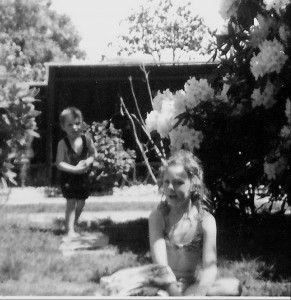 It was at our next house that I well and truly saw his violence. My mother was still my abuser. Without help, an abuser doesn’t change. And alcholism and Valium contributed. My father was not an alcoholic, nor addicted to Valium, but he was a binge drinker and now he was throwing parties in our new house every week.
It was at our next house that I well and truly saw his violence. My mother was still my abuser. Without help, an abuser doesn’t change. And alcholism and Valium contributed. My father was not an alcoholic, nor addicted to Valium, but he was a binge drinker and now he was throwing parties in our new house every week.
They would both start out charming, sociable, all meet and greet. But by the end of the night both of them were over the top either flirting with or getting it on with someone other than each other. Then the tone would change and the house would turn into something from The Shining. Hard to know the chicken and egg of it. They were both mouthy, foul, with tones of disgust at each other. Then glass would get smashed and the phone would be ripped out of the wall. Sometimes she’d slap him or threaten him with a broken glass or grab a knife and wield it. Then he’d grab her by the hair, drag her about, rip her clothes. Then it was all shoves, punches, kicks. Too many times he’d smash her false teeth again and knock her unconscious. Too many times he’d strangle her or threaten to burn her with a lit cigarette. Too many times he’d then kick her whilst she was on the floor, breaking her ribs. Sometimes the guns would come off the wall (he had a collection) and sometimes they’d get fired. Sometimes it was her firing them, sometimes it was him. At least once I saw him rape her whilst she lay there unconscious.
The police would commonly arrive, usually because I had learned to call them from the phone box around the corner. Then they’d take Jack away for the night (if they could find him) and the next day he’d return, contrite, ashamed, and she’d never press charges. Why would she? There was no single mother’s pension in the early 70s, no women’s refuges for her to go to (and besides, he’d always bolt after the violence so she didn’t need to bolt from him). She was uneducated, from a dysfunctional and disadvantaged background in which abuse and violence was normal. She had no friends, no relationship with the neighbors. We were the family they closed the blinds on, pretended they weren’t home when the violence was happening yet again.
And my older brother, me and my younger brother saw this sort of thing for the 7 years I continued to live with them and it continued for years after I left until they no longer lived together.
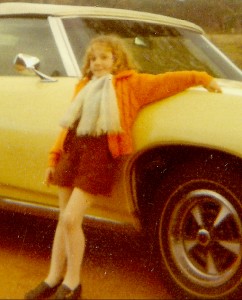 Around 1am, when I was 8 I would leave the house and go around the corner to the house of a 10 year old Italian girl I’d befriended (actually I’d sworn at her until she chased me, then she ultimately made me her ‘mascot’) and I’d the throw stones at the bedroom window of the around the corner until she would let me in. Her mother caught me and told me (in Italian, via her daughter as translator) that I could stay if I arrived at a decent hour. This lasted 2 years for me and it was not until I was an adult that I learned this entire family of five kids and the mother were already regularly having to walk around the streets at night when their own father had drunken rages, committing domestic violence on his wife.
Around 1am, when I was 8 I would leave the house and go around the corner to the house of a 10 year old Italian girl I’d befriended (actually I’d sworn at her until she chased me, then she ultimately made me her ‘mascot’) and I’d the throw stones at the bedroom window of the around the corner until she would let me in. Her mother caught me and told me (in Italian, via her daughter as translator) that I could stay if I arrived at a decent hour. This lasted 2 years for me and it was not until I was an adult that I learned this entire family of five kids and the mother were already regularly having to walk around the streets at night when their own father had drunken rages, committing domestic violence on his wife.
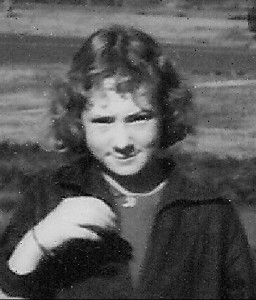 By my teens I was homeless and eventually accepted relationships with older men to live in ‘domestic prostitution’ and avoid worse. This meant I lived with men who saw me as free sex and that is no basis for respect or decent treatment. The first one I lived with when I was 15 began to punch me up and rape me as if it was ‘normal’. I didn’t think to run away because I was from a home that was just as bad and probably more unpredictable and even more dangerous. The next one I lived with was a bit better on account of my ability to feign enjoying his sexploitation of me. He was from a home of extreme domestic violence himself. He was psychologically and verbally abusive, hit walls above my head, manhandled me. But I can thank a huge and hefty female next door neighbor for taking him to task and informing him she was listening, watching and he’d be answerable if he harmed me. As a result, he never escalated into the violence I’d seen in my parents. I also learned from this neighbor standing up for me that it was not normal to accept abuse, that it was ok for me to expect more from life, from a partner, from a ‘home’.
By my teens I was homeless and eventually accepted relationships with older men to live in ‘domestic prostitution’ and avoid worse. This meant I lived with men who saw me as free sex and that is no basis for respect or decent treatment. The first one I lived with when I was 15 began to punch me up and rape me as if it was ‘normal’. I didn’t think to run away because I was from a home that was just as bad and probably more unpredictable and even more dangerous. The next one I lived with was a bit better on account of my ability to feign enjoying his sexploitation of me. He was from a home of extreme domestic violence himself. He was psychologically and verbally abusive, hit walls above my head, manhandled me. But I can thank a huge and hefty female next door neighbor for taking him to task and informing him she was listening, watching and he’d be answerable if he harmed me. As a result, he never escalated into the violence I’d seen in my parents. I also learned from this neighbor standing up for me that it was not normal to accept abuse, that it was ok for me to expect more from life, from a partner, from a ‘home’.
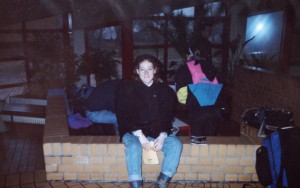 I got help, got education, changed my life to avoid abusers. But growing up with abusers hones co-dependency and it was not long before I found myself entrapped with another one. He was homeless and had played his hard luck story on me and I’d let him move in. After all, he was a victim, not a perpetrator. But soon he was completely controlling me, ranting and becoming volatile if I so much as closed the toilet door when going to the toilet. He would not ‘allow’ me to work anywhere he didn’t work with me so we had to get jobs at the same place or work markets together when there were no jobs. He would get agitated and ranting if he felt I was making a friend or had even smiled at anyone. He had ripped my clothes in rage and then I defended myself with a small axe. Now I had become like my parents. After 18 months of being completely controlled and intimidated by this abuser, I finally ran away in the middle of the night, sleeping in my car, crossed the country to escape him and hid as he came to find me and get me back. I successfully got my life back, it took time.
I got help, got education, changed my life to avoid abusers. But growing up with abusers hones co-dependency and it was not long before I found myself entrapped with another one. He was homeless and had played his hard luck story on me and I’d let him move in. After all, he was a victim, not a perpetrator. But soon he was completely controlling me, ranting and becoming volatile if I so much as closed the toilet door when going to the toilet. He would not ‘allow’ me to work anywhere he didn’t work with me so we had to get jobs at the same place or work markets together when there were no jobs. He would get agitated and ranting if he felt I was making a friend or had even smiled at anyone. He had ripped my clothes in rage and then I defended myself with a small axe. Now I had become like my parents. After 18 months of being completely controlled and intimidated by this abuser, I finally ran away in the middle of the night, sleeping in my car, crossed the country to escape him and hid as he came to find me and get me back. I successfully got my life back, it took time.
We think of domestic violence as being something done by crazy people. But it is done by people. We think of it as something we’d know was going on. But over the years most of those living with domestic violence somehow kept it under cover. We think it is something that happens in ‘bad families’, but I’ve seen it in educated, professional, affluent families, families of different nationalities and cultures. I’ve seen it in opportunists whose families were shocked their child could be a perpetrator because they were not from ‘that kind of background’. I’ve seen it in women who provoked attacks and in co-dependent partners who stayed with their attackers until they became the attacker themselves.
If we are to understand and turn around domestic violence, we must hear the stories and get past the stereotypes. We must connect, speak up, speak out, question, learn, grow, and change. It is the responsibility of the individual, but if the individual knows no better or has no support to change, no drive to do so, then it is also the responsibility of the community to speak up. It is up to the local charities and local governments, the state governments and national government to support the services, policies and responses that can change these lives. It’s about more than just women’s refuges. It’s about challenging the ‘normality’ of abuse, being determined that those committing it face their actions, their values, their habits, their choices. This is not just a men’s issue, it is also a women’s issue, and it becomes the issue of their children. We can break this cycle.
Donna Williams, BA Hons, Dip Ed.
Author, artist,and presenter.
http://www.donnawilliams.net
I acknowledge Aboriginal and Torres Strait Islander people as the Traditional Owners of this country throughout Australia, and their connection to land and community.
